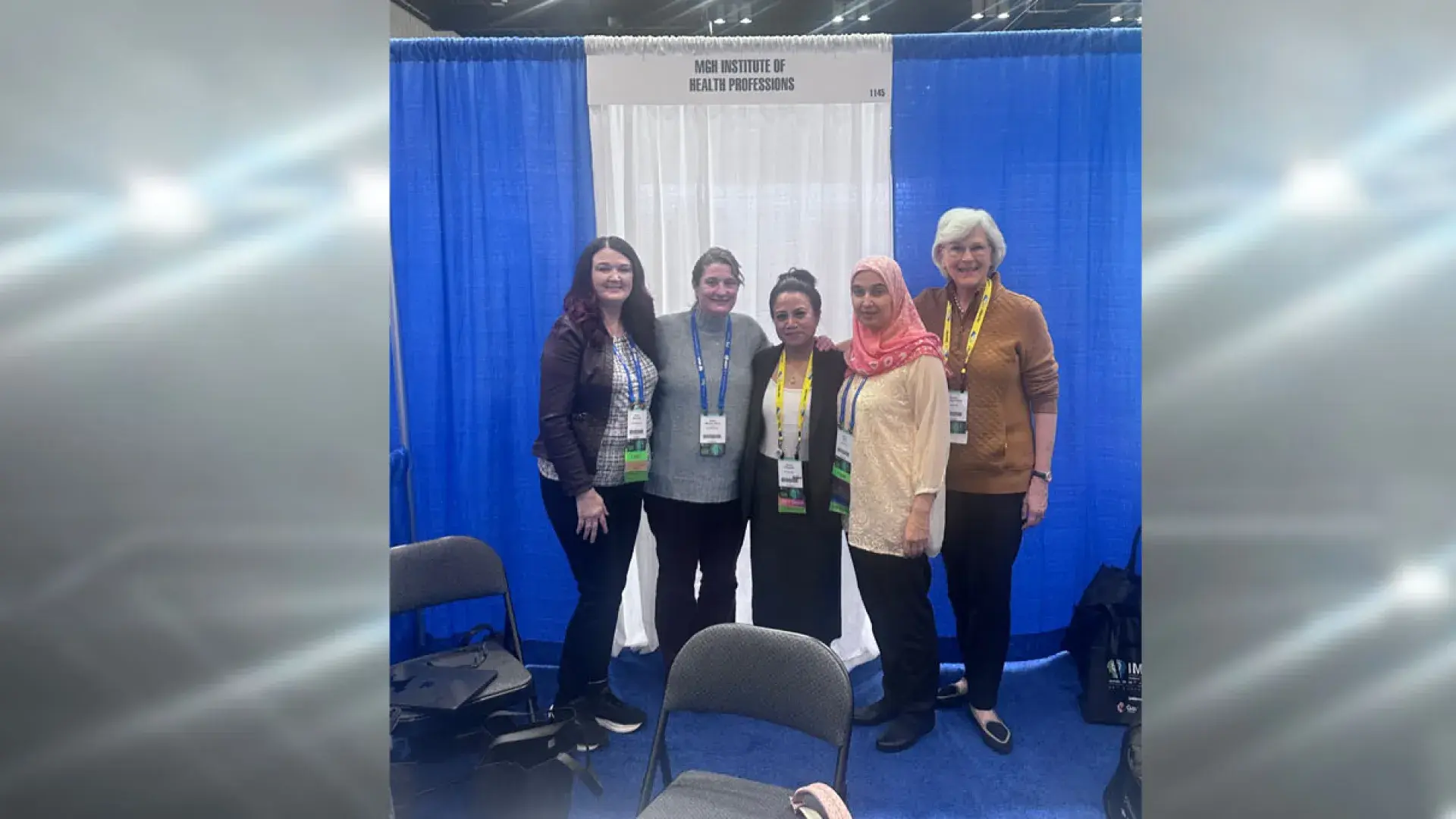
Dozens of presentations at a recent international conference solidify the Institute’s presence in healthcare simulation
It’s the annual gathering that brings together the world’s experts in simulation use, research, and design, and some might say, a showcase for the MGH Institute of Health Professions. At the International Meeting on Simulation in Healthcare (IMSH), held last month in Orlando, the Institute’s Department of Health Professions Education was well represented with approximately 60 presentations by faculty, alumni, and students.
“That many presentations makes us a force in the industry, in the academic production of future scholars in simulation,” said Associate Professor Suzie Kardong-Edgren, who attended the event along with more than two dozen MGH Institute faculty, staff and students. “The number of presentations by one school entity - there's nobody who matches this.”
Not only did the Health Professions Education Program make its mark with the substantial number of presentations, but it also landed four publications in the Society for Simulation in Healthcare’s “Articles of Influence Awards,” which highlights articles that have had a strong impact on practice and research in healthcare simulation. The MGH Institute awardees included: Objective structured clinical examinations (OSCEs) for high-stakes assessment of certified registered nurse anesthesiologists in Clinical Simulation in Nursing, co-authored by faculty member Suzie Kardong-Edgren; The impact of the simulation debriefing process on learning outcomes – An umbrella review protocol in Clinical Simulation in Nursing, co-authored by alumnus Jabeen Fayyaz; Global consensus statement on simulation-based practice in healthcare in Simulation in Healthcare, co-authored by faculty member Matt Charnetski; Development of distance simulation educator guidelines in healthcare: A Delphi method application in Simulation in Healthcare, co-authored by alumni and faculty members Maria Bajwa, Hani Lababidi, and Cynthia Mosher faculty members Janice Palaganas and Rami Ahmed, , and alumni Melissa Morris and Alex Morton, ; Healthcare Simulation in Person and at a Distance: A Systematic Review in Simulation in Healthcare, co-authored by student Nuha Birido, faculty members Janice Palaganas, Jared Kutzinand Matthew Charnetski, and alumna Dawn Wawersik.
“Our students are actually getting awards for the work they're doing with us, and part of that can be attributed to our network, our expertise, and the rigor in which we ask them to do the work,” saidPalaganas, Founding Director of the Center of Excellence in Healthcare Simulation Research. “We don't let them just do something that's going to be forgotten. We really push them to the edge.”
That showed in the wide range of presentations, whose titles included: “How Does AI Understand Us?,” “Engaging Audiences with Holographic Content,” “Simulation ethics - Will AI Replace the Simulationist?,” “The Future of AI in Healthcare,” “Moral Courage Through Health Professions Education,” and “Trust Equation: Unlocking the Power of Risk, Perception, and Distance.”
“The only way you get accepted here is that you've got something new and different to say that has not been heard before,” said Kardong-Edgren. “The people with expertise are the ones who get to speak.”
All of which is an endorsement of what the HPEd program is producing, and that explains how the program is attracting big names in the industry, from adjunct professor Jared Kutzen, who is the Society for Simulation in Healthcare President, to Mark Scerbo, immediate past editor-in-chief of Simulation in Healthcare, and Debra Nestel, editor-in-chief of the International Journal of Healthcare Simulation, both faculty at the IHP’s Center of Excellence in Healthcare Simulation Research.
“We know enough people with our faculty that we can pull in good people who want to lecture with us, work with us,” said Kardong-Edgren. “They know who we are, and they say yes to us. There is no other program like ours in the United States.”
Thanks to the MGH Institute’s presence in Saudi Arabia and its annual entries to the international conference, the program’s reputation is beginning to spread globally.
“I think our presence at IMSH and our faculty, students, and alumni presenting their work really helps to feed the whole perception of the MGH Institute in the simulation community,” said assistant professor Cynthia Mosher, who teaches both in Boston and Saudi Arabia’s capital city of Riyadh. “I'm very proud of it, because I come from that position of being a student and going through that experience. And I can speak to that networking because that really helped me move forward with everything that I did.”
Moving forward is exactly what the program has been doing, especially over the past four years of continued growth.
“We’re very intentional and very inclusive,” said Palaganas. “When we put together committees and scholarly project teams, we are constantly thinking about which expert in the field will take a particular student under their wing to position them to be leaders in their area. What we’re doing is working. It’s exciting to see the effect on our students and our program.”
Do you have a story the Office of Strategic Communications should know about? If so, let us know.
